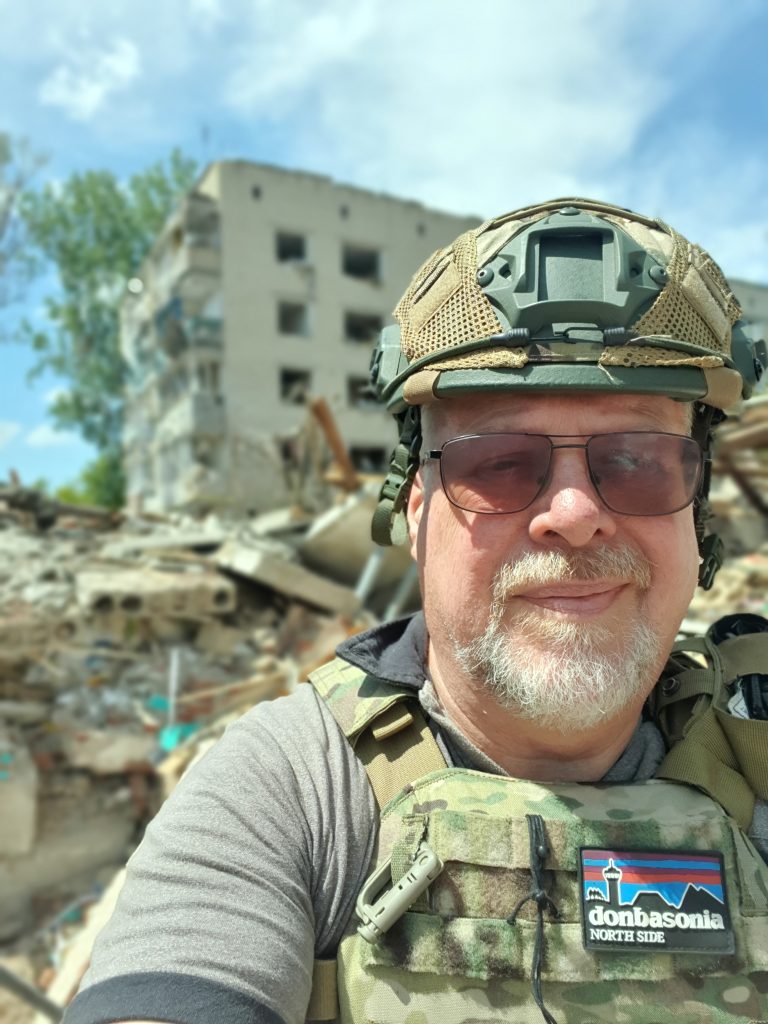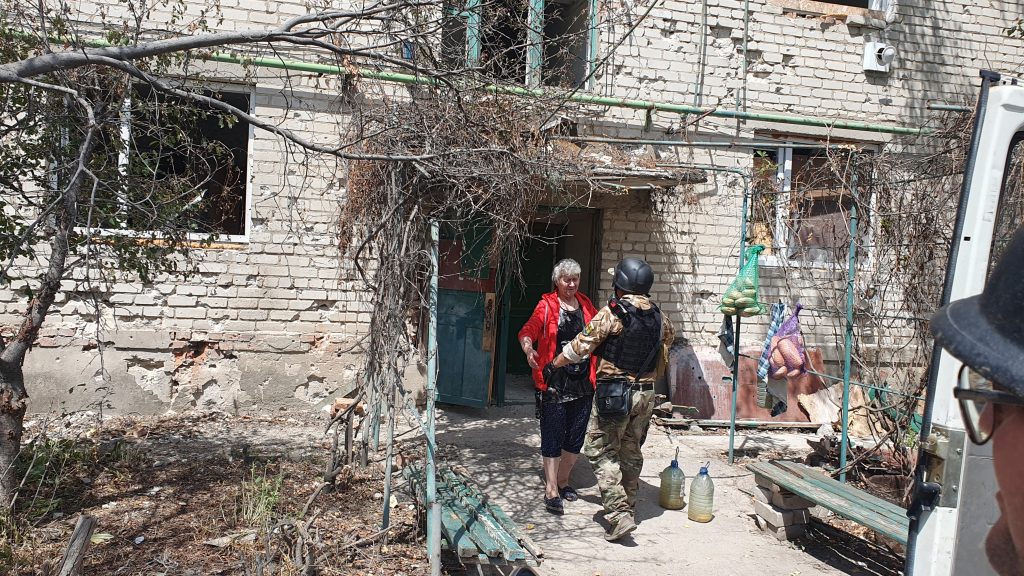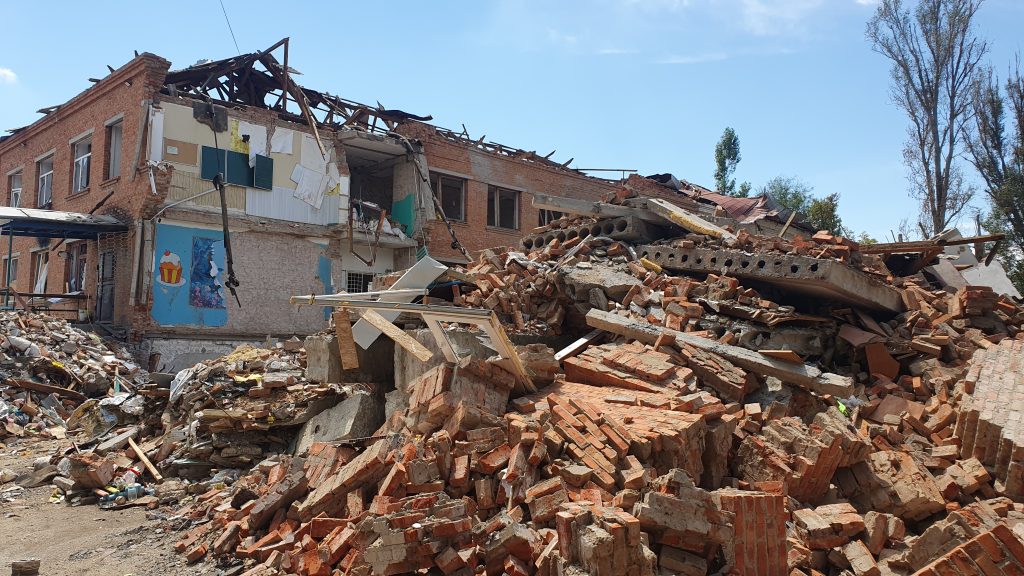Since the start of the Ukraine conflict in 2022, the Christian charity Feed the Hungry (FTH) has sent more than 180 lorries (3,000 tons) of food and aid to Ukraine. In July 2023 their CEO, Gwyn Williams, visited the war-torn country to see their work with local partner organisation Bread of Life. Here are extracts from his personal account:
We started with a day at the warehouse of our partner organisation Bread of Life in Bucharest, readying five vehicles including the resources for a new mobile kitchen to go to Izmail (in South Eastern Ukraine, just across the border from Romania).
From Izmail we made a 12-hour and 738 km journey to Zaporizhia. This took us through cities we have been used to hearing about in the news, including Odessa, Mykolaiv, past Kherson and Nikopol. It was a journey of sunflowers, checkpoints and lorries. There were convoys of lorries stretching bumper to bumper for miles and miles, thousands of trucks heading for Izmail because the port of Odessa had been bombed.

The Zaphorizhia chaplaincy team is made up of serving military personnel and recovered wounded soldiers who have dedicated their leave and spare time to help distribute food to villages near the front. They also prepare hot food for the poorer areas of the city in one of the mobile kitchens that we had supplied previously. They operate from a makeshift hut of sorts. There are chairs made of pallets next to a hotchpotch of vehicles including a dentist on wheels. We held a time of worship with a gathering of around 30 men and women who shared their heartache over tragedies they had witnessed.
Then it was action stations, orders were given and two vehicles filled with provisions for the locations to receive food that day. One of these was Bakhmut, another front-line town with whose name we have become familiar. It was time for me to get kitted out with a flack jacket and helmet.
It’s a two-hour journey from Zaphorizia to Bakhmut. Along the way one of the team turned around to Pastor Jan (from Izmail) and asked: ‘He does realise where we are going doesn’t he?’ To which I nodded in the slow realisation of what he meant by the question.
It went from heavy traffic to just a few cars and a greater number of green and camouflaged vehicles. There was barely a tractor in the fields. Light armoured vehicles protected key junctions along the route. We switched off our phones, action plans were described and evacuation procedures discussed.
‘An apocalyptic scene of devastation’
As we arrived in the outskirts of Bakhmut we saw more and more damaged houses. The urban landscape became an apocalyptic scene of devastation, full of craters. We stopped in front of a block of flats that had every window blasted out with furniture hanging out of the gaping holes. I thought this building had to be deserted, and yet a woman emerged from a narrow cellar door. She was smiling, so glad to see us.

When you walk through the rubble of Bakhmut you walk into the centre of a nation’s struggle to survive. You see its courage, its pain, its resilience, its tears, its struggle to stand for what it holds dear, all of which I saw in the eyes of the lady in red as she stepped out of a cellar door to greet us. As the bombs dropped around us she stood in silence for a moment, in defiance of what she faced, then turned and disappeared into the cellar to make us a cup of fruit tea. That moment in time made me understand the heartbeat of Ukraine.
We moved on to a second aid drop and as soon as we opened the doors to the back of the van, shells began to pop around us. We retreated to the cellar. I watched the people’s faces and saw a twitch in the corner of their eyes when the shelling got close.
As the shelling eventually dissipated, we moved off to visit a community church that had been bombed. It had been set up as a social outreach with shower rooms, barbers, and a creche for children to be safe in. Eight people, who had been serving others, died when it was destroyed.

‘Love in desperate places’
We drove back to Izmail where Pastor Jan and his team had established a church in a cellar. It had beds, showers and a barber. Izmail is still popular with people transitioning through to other European countries and with mothers with children seeking a safe place to live within the borders of Ukraine so they could be as near as possible to their husbands.
The next day it was Sunday and the atmosphere in the church was one of hope deferred with the pain of reality. I had been invited to preach and I spoke of love in desperate places and how God’s provision was being stored up for his people in Ukraine even before the war had started.
Now I’m back safely in England, I’ve been reflecting on how by working together churches in this country are providing food which is bringing hope in the storm. Thank you for the donations, which continue even after more than 500 days of attrition. With our local partners, we are committed to sending food aid to those who need it most in cities and villages right across the country. This is an immediate need but we also need to plan for how we will help future renewal and restoration both physically and spiritually in Ukraine.
Learn more about the work of Christian charity Feed the Hungry.
Feed the Hungry is a Charity and Network in Association with CTE.